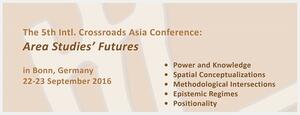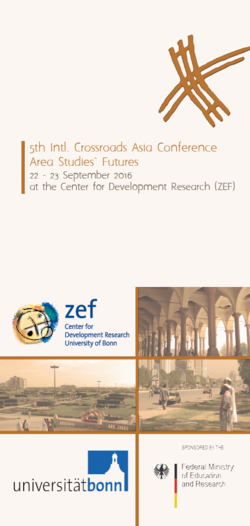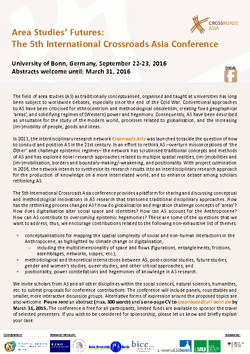The 5th International Crossroads Asia Conference: Area Studies' Futures

The field of area studies (AS) as traditionally conceptualised, organised and taught at universities has long been subject to worldwide debates, especially since the end of the Cold War. Conventional approaches to AS have been criticised for ethnocentrism and methodological obsoletism, creating fixed geographical ‘areas’, and solidifying regimes of (Western) power and hegemony. Consequently, AS have been described as unsuitable for the study of the modern world, as they fail to capture processes related to globalisation, and the increasing (im-)mobility of people, goods and ideas.
In 2011, the interdisciplinary research network Crossroads Asia was launched to tackle the question of how to conduct and position AS in the 21st century. In an effort to rethink AS ─overturn misconceptions of ‘the Other’ and challenge epistemic regimes─ the network has scrutinised traditional concepts and methods of AS and has explored novel research approaches related to multiple spatial realities, (im-)mobilities and (im-)mobilisation, borders and boundary-making/-weakening, and positionality.
The 5th International Crossroads Asia conference has provided a platform for sharing and discussing conceptual and methodological innovations in AS research that transcend traditional disciplinary approaches.
Below and in the the conference flyer is a schedule of events, all of which were held at the Center for Development Research (ZEF) in Bonn, Germany.
You can find information about the conference speakers here.
The full conference report can be found here.
Watch video interviews of conference participants on the future of area studies here.
- Prof. Dr. Anna-Katharina Hornidge on epistemic hegemonies and the interrelation of area studies and the disciplines.
- Prof. Dr. Vincent Houben on redefining “area” as a relational, multi-scalar concept for understanding processes of globalization.
- Prof. Dr. Patrick Köllner on comparative area studies and their role in the future of area studies.
- Prof. Dr. Martin Sökefeld on the relevance of the state and its deconstruction for area studies.
Conference Schedule
(see conference flyer for further details)
Wednesday, Sept 21st
14:00-18:00 — CrossArea e.V. Annual Meeting — See the meeting flyer for more information
Thursday, Sept 22nd
10:30-12:30 — Pre-Conference Event with CrossArea e.V.: Situation der Area Studies in Deutschland (in German) with Corinne Flacke (DFG); Rolf Geserick (DLR); Matthias Middell (CrossArea e.V.); Stefanie Rentsch (Forum Transregionale Studien); and Conrad Schetter (BICC/ Crossroads Asia)
13:00-14:00 — Registration
14:30-15:00 — Welcome Address by Crossroads Asia Coordinator Claus Bech Hansen
15:00-16:15 — Public Keynote Lecture by Shelley Feldman (Cornell University), Decommodifying knowledge: Recuperating the Interdisciplinarity of Area Studies
16:15-16:30 — Break
16:30-18:00 — Presentation of the book Area Studies at the Crossroads. Knowledge Production after the Mobility Turn, edited by Katja Mielke (Bonn International Center for Conversion) and Anna-Katharina Hornidge (Leibniz-Zentrum für Marine Tropenökologie (ZMT) and University of Bremen)
18:30-20:00 — Tour of the City of Bonn
Friday, Sept 23rd
08:00-09:00 — Registration
09:00-10:30 — Session 1 Panels
Session 1: Querying Power Constellations and Destabilizing Epistemic Regimes
Panel 1a. Deconstruction of Western Knowledge and the Category ‘Other’
Chaired by Dietrich Reetz, Crossroads Asia, ZMO Berlin
- Anindya Sekhar Purkayastha (Kazi Nazrul University)
- Zarifa Mamedova (TU Dortmund)
- Andreas Mandler (ZEF, University of Bonn)
Panel 1b. Reshaping Places – Mastering Uncertainty: A Second Take on Area Studies in the Baltic Sea Region and Eastern Europe (Roundtable Event)
Chaired by Claus Bech Hansen, Crossroads Asia, ZEF, University of Bonn
- Rebecka Lettevall (Södertörn University)
- Jenny Gunnarson Payne (Södertörn University)
- Kazimierz Musiał (Södertörn University)
10:30-10:45 — Coffee Break
10:45-12:15 — Session 2 Panels
Session 2: Mapping the Socio-Spatial Complexity of Human and Non-Human Interactions
Panel 2a. Shedding Light on Agency and the Social Construction of Space
Chaired by Anna-Katharina Hornidge, Crossroads Asia, ZMT, University of Bremen
- Henryk Alff (Crossroads Asia, Leibniz Institute for Regional Geography) and Andreas Benz (Crossroads Asia, University of Augsburg)
- Patrick Köllner (GIGA Hamburg)
- Martin Sökefeld (Crossroads Asia, LMU Munich)
- Manja Stephan-Emmrich (HU Berlin)
Panel 2b. Space, Place and Time
Chaired by Hermann Kreutzmann, Crossroads Asia, Free University of Berlin
- Agnieszka Joniak-Lüthi (Crossroads Asia, LMU Munich)
- Thomas White (Cambridge University)
- Madlen Kobi (Zurich University)
12:15-13:45 — Lunch Break
13:45-15:15 — Session 3 Panels
Session 3: Critical Conceptual and Methodological Intersections with Area Studies
Panel 3a. Exploring Methodological Limits and Possibilities in Area Studies Research
Chaired by Eva Youkhana, Crossroads Asia, ZEF, University of Bonn
- Elena Trubina (Ural Federal University)
- Helena Cermeño (ZEF, University of Bonn)
- Cornelia Reiher (FU Berlin) and Sarah Ruth Sippel (University of Leipzig)
Panel 3b. Intersections of AS, Post-Colonial Studies, Cold War Studies and Future Studies, Taking the Example of Development Discourses (Roundtable Event)
Chaired by Shelley Feldman, Cornell University
- Anna-Katharina Hornidge (Crossroads Asia, ZMT & University of Bremen)
- Sandra Kurfürst (GSSC, University of Cologne)
- Wolfram Schaffar (University of Vienna)
- Ines Stolpe (University of Bonn)
15:15-15:45 — Coffee Break
15:45-17:15 — Session 4 Panels
Session 4: Positionality and the Space(s) of Knowledge Production
Panel 4a. Re-constructing Positionalities in Area Studies Research
Chaired by Epifania Amoo-Adare, Crossroads Asia, ZEF, University of Bonn
- Elena Smolarz (Crossroads Asia, University of Bonn)
- Lenny Martini (ZEF, University of Bonn)
- Jelena Gledić (Belgrade University)
- Bianca Boteva-Richter (University of Vienna)
Panel 4b. Borders and the Politics of Belonging
Chaired by Conrad Schetter, Crossroads Asia, Bonn International Center for Conversion
- Antía Mato-Bouzas (Crossroads Asia, ZMO Berlin)
- Just Boedeker (Berlin)
- Gennaro Errichiello (Loughborough University, UK)
- Seema Kazi (Center for Women's Development Studies, New Delhi)
- Eva Youkhana (Crossroads Asia, ZEF, University of Bonn)
17:15-17:30 — Closing remarks









